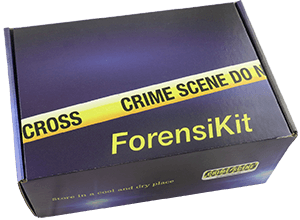
Byron Brooks interview
January 24, 2021 – 11:33 a.m.
Byron Brooks is the victim's brother. He lives in Grand Junction, Tennessee, but was in Oxford for this interview.
Detectives Armstrong and Murphy interviewed him at the Yoknapatawpha County Sheriff's Department.
Participants:
- Detective T. Armstrong
- Detective S. Murphy
- Byron Brooks
Detective Murphy: Thanks for coming in.
Byron Brooks: It's no problem. I came down this morning to help out Virginia and Wesley.
Detective Murphy: Could you state your name and address for the record?
Byron Brooks: Byron Brooks. I live in Grand Junction, Tennessee. 436 Adams.
Detective Murphy: And what is your relationship to Spenser Brooks?
Byron Brooks: I'm his brother. Or was. It's so strange. I came here to see him, and then he was gone. It's been awful to think about. "The better days of life were ours;/ The worst can be but mine." Lord Byron.
Detective Murphy: Sorry, what do you mean you were here to see him?
Byron Brooks: Yesterday. I drove down and back in time for dinner and didn't know what happened. Virginia called last night. She must have been in complete shock.
Detective Armstrong: You were here in Oxford yesterday?
Byron Brooks: Yes. Spenser wasn't returning my calls. Our mother is dying, and I had to let him know if he wanted to see her, he should come now. I came down to find him in person.
Detective Armstrong: What time did you get here?
Byron Brooks: Right around noon, a little before?
Detective Armstrong: Did he know you were coming?
Byron Brooks: No. On the way down, I tried calling, but no one was home, so I left a message on his cell.
Detective Armstrong: Where did you go when you got to town?
Byron Brooks: I hadn't heard anything from him, so I went to lunch and left a couple more messages on Spenser's cell. It’s strange to think—well, he was already gone by then—and I went to the house just in case his battery died or something. Virginia was there but said she didn't know when he was going to be home. Then I went to Uptown Coffee and caught up on email.
Detective Armstrong: Why didn't you go to the house when you first arrived in town?
Byron Brooks: I wanted to talk to Spenser more than I did Virginia. That's why I didn't hang around the house until he came back.
Detective Murphy: Where did you eat lunch?
Byron Brooks: Handy Andy's. I missed the barbecue.
Detective Armstrong: Seems odd to make that long drive from Tennessee just because you couldn't get your brother on the phone.
Byron Brooks: The ride's not bad. Highways 18 and 7—or is it 7, then 18? I don't even notice anymore. It's like I'm on autopilot. Anyway, it's barely an hour. No offense, but the roads are pretty empty, so … you know. It's a straight shot.
Detective Murphy: Do you come down here a lot?
Byron Brooks: To see Spenser? No. We didn't have the greatest relationship. I guess we saw each other a few times a year. Growing up here, though, I know the roads.
Detective Armstrong: Do you recall the place where Spenser died?
Byron Brooks: A park. Wall Doxey. Is that the one near Sardis Lake? No, it's the other side of the highway, right?
Detective Murphy: Have you ever been there?
Byron Brooks: Sure, a few times.
Detective Murphy: Did you stop there yesterday?
Byron Brooks: No. Oh God, are you thinking—? We didn’t get along, but I would never hurt him. Just because I drove past it doesn't mean anything.
Detective Murphy: Tell us about the argument with Spenser.
Byron Brooks: What argument?
Detective Murphy: You and Spenser didn't have a disagreement.
Byron Brooks: Hold on. Do I need a lawyer?
Detective Armstrong: I don't know. Do you?
Byron Brooks: No. No, of course, I want to help. But it was not an argument.
Detective Murphy: Okay, then, you came down here just to talk. About what?
Byron Brooks: Our mother. She's dying of Lou Gehrig's. It could happen any day now. I moved her up to Grand Junction a couple of years ago, and that really made him angry. We were always pretty different, but after that, we barely spoke.
Detective Murphy: Why's that?
Byron Brooks: He thought I didn't have the right, but she's my mother, too. She deserves to die with dignity. He wouldn't take her in or move in with her when it was so obvious that's what she wanted. After Dad died, she was so scared, but he just wanted to pay people to make the problem go away. So much for family values.
Detective Murphy: That's a little harsh, isn't it?
Byron Brooks: I'm sorry. You knew Spense, didn't you? Both of you, of course. I'm sorry. But I prefer to honor him by remembering him like he really was, not like I wish he was. Do you understand?
Detective Murphy: Go on.
Byron Brooks: He was a conservative, and by definition, that means he didn't want to change. I think he was as scared as she was, but it's not like he needed to worry. He was still her favorite.
Detective Murphy: What do you mean?
Byron Brooks: The time he came to visit her, she was so happy she cried. She kept thanking him when, of course, she's never thanked me or Hannah. That's not why we're doing it, you understand.
Detective Murphy: Of course not.
Byron Brooks: I knew it would be hard for her to be uprooted after so many years, but I wanted her to be with family for the end of her life, and Spenser didn't want to do it. If she'd stayed here, she would have died in a hospital alone. Other cultures are better at handling this. It's normal for extended families to live under the same roof. But Spenser wasn't open to that.
Detective Murphy: I don't understand. Did your mother want to move in with you or not?
Byron Brooks: Yes, of course. We would never force her. It was her choice. She said she was ready for a change and didn't want to be surrounded by her memories of Dad. She wanted to spend time with Belen. That's our daughter. But if I had to guess, I'd say she hoped the decision would force Spenser to act.
Detective Murphy: And he didn't?
Byron Brooks: No. Sorry to burst your bubble.
Detective Armstrong: Has your mother changed her will since she moved in with you?
Byron Brooks: No. Not to my knowledge.
Detective Armstrong: So how does it stand now?
Byron Brooks: The estate will be split fifty-fifty. The last time we talked about it was right after Dad died.
Detective Murphy: Is that fair?
Byron Brooks: No. What do you want me to say? I don’t think it's right. We’ve taken out a second on the house. Hannah has turned down work. That hasn't changed anything in terms of us helping her, but it would be nice if we could get something back. I never proposed anything radical, but Spenser would accuse us of trying to con our way into taking everything, which is borderline slander.
Detective Murphy: So you argued about it?
Byron Brooks: Sure. Once or twice.
Detective Armstrong: Are you a beneficiary in your brother's will?
Byron Brooks: I don't know. I doubt it.
Detective Murphy: What else did you and Spenser disagree about?
Byron Brooks: Everything. I mean that literally. You name it—parenting, schools, politics, sports, travel, hobbies—we were just completely opposite. I think it comes from the traveling I've done. I doubt he's even been to Canada. It gives you a broader view. And women … well, you know Virginia.
Detective Murphy: How do you mean?
Byron Brooks: I'm sorry if I seem out of line to you, but she's like a Stepford wife. Never had an opinion of her own. Always parroting what Spenser or the RNC told her. That's what he wanted in a woman—someone he could control. It wouldn't surprise me if he was running around on her, just to prove he could keep her in the dark.
Detective Armstrong: You have proof he was unfaithful?
Byron Brooks: No. Of course not. But—
Detective Armstrong: Well, then, I'll respectfully ask you to stick to what you know.
Byron Brooks: Okay. Sure. I'm sorry. This is upsetting to me, too. And I feel for Virginia. I've seen it with Mom. It's disorienting to be widowed after so many years. But if you really want to get to the bottom of this, you're going to have to face the truth of who he was. That's all I'm saying. I'm maybe not the best judge of that, but I doubt Virginia is, either.
Detective Armstrong: Your opinion is noted.
Detective Murphy: Okay. So what happened yesterday? After you had lunch.
Byron Brooks: I waited until about 3:30 p.m., leaving more messages. I probably left three or four, all told. Then I swung by the house before going home.
Detective Murphy: You didn't notice anything unusual on the drive home?
Byron Brooks: You mean at the park. I must have. Yeah. It didn't look like much from the road. But the patrol cars— I slowed down.
Detective Murphy: You didn't stop?
Byron Brooks: Why would I? I'm sorry, but I drove down to Oxford to see my brother, he wasn't there and didn’t answer my calls, and on the way back, there was some kind of police activity in the park. How could I possibly know they were connected?
Detective Armstrong: He didn't tell you he was going there?
Byron Brooks: No.
Detective Murphy: Did he tell you who he was meeting?
Byron Brooks: No, I didn’t know anything about it.
Detective Murphy: Did he ever mention anyone by the name of Debra Lane?
Byron Brooks: No.
Detective Murphy: Do you know her?
Byron Brooks: No.
Detective Murphy: What about Jill Ross?
Byron Brooks: No.
Detective Armstrong: Can you think of anyone else we should talk to?
Byron Brooks: Aside from Virginia? I wouldn't know. Someone at work?
Detective Murphy: Why do you say that?
Byron Brooks: I can't imagine killing someone. I don't know much about Spenser's job, but he's the D.A., right? He probably interacted with plenty of people who don't have that restraint. There must be plenty of people he put away for years, whose lives were ruined, who were poor and desperate from the start and went downhill from there.
Detective Murphy: You make it sound like the bad guys are the good guys.
Byron Brooks: I'm just saying it's complicated. But Spenser would have disagreed.
Detective Armstrong: Okay. That's enough for now. Please stay in touch, and let us know if you're traveling.
Byron Brooks: Of course. If you need me, just call.
Detective Murphy: Will do. Thanks again for coming in, Mr. Brooks.
Interview ended – 12:04 p.m.
Useful Links
Login
Contact
Crime Scene
3602 N 16th St
Phoenix, AZ 85016
Voice (623) 565-8573
Fax (602)-274-7280
For Crime Scene Store inquiries: store@crimescene.com
For technical assistance: support@crimescene.com

